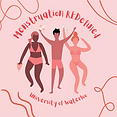Sustainable Periods
- Taylor Truong

- Aug 26, 2021
- 2 min read
Finding ways to live a sustainable lifestyle has been on the rise with the increasing awareness of human carbon footprints and lifestyle choices. Many young adults have been advocating for choosing sustainable options as opposed to commonly used and disposable products. Some changes are simple such as using a reusable cloth instead of using a paper towel or refilling a reusable water bottle instead of buying a case of plastic bottles. On the other hand, there are many changes that would be considered heavy investments or far fetched financial burdens for some. How does this apply to period products?
What are sustainable menstrual products?
The sustainable market initially started with many small businesses and handmade products. In terms of menstruation products, this included reusable and washable cloth pads or period underwear. With the rise in popularity of eco-friendly products, many companies have also gained attention such as DivaCup, nixit, and Rael. The options are endless when it comes to finding products that work for every individual. In addition to cloth pads and period underwear, there are also reusable cotton pads, menstrual cups, reusable tampon applicators, applicator-free tampons, and menstrual discs, just to name a few.
At what cost?
Many of these sustainable period products cost more upfront than the average disposable product. While a menstrual cup may last someone many years to come, spending that initial money to buy one may be difficult. This leads many to wonder if sustainability and equity can both be satisfied. In public places such as schools, equity can be achieved with free access to menstrual products but those products may not be a sustainable option. Donations that are made to women’s shelters, food banks, and other organizations are typically disposable pads or tampons. Equity and access are often addressed by supplies of disposable products but at what cost to the environment?
How can we as a society achieve both sustainability and equity?
It starts with bringing awareness to the cause and pushing for change. Many people see and feel the pressures of trying to live a more eco-friendly lifestyle but are not given the appropriate resources to do so. Living sustainably should not be a luxury. Pushing for access to sustainable menstrual products for all is a step towards both sustainability and equity. This could be as small as schools offering eco-friendly options across campus to as large as governments pushing for policies that support and fund this movement.


Commenti